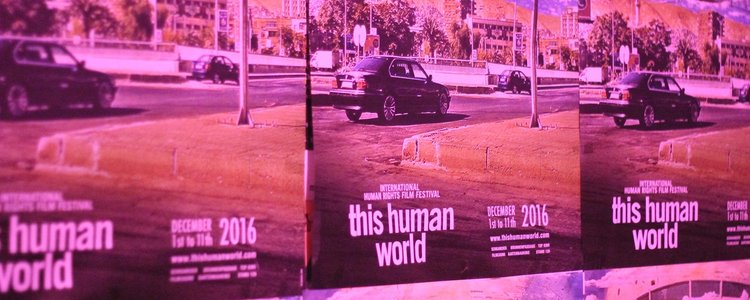The first evening was dedicated to Central America and the topics of tropical forests and the role of indigenous population and transnational companies as well as to the life and work of Berta Cáceres, an environmental and human rights activist from Honduras who was murdered in 2016. This evening was organised by the Commission for Development Research (KEF). A detailed report about the movies and the discussion can be found here.
On the 8th of December the film days moved to a different geographic region and dedicated the evening to social developments in East Africa. The movie "Unforgiven: Rwanda" addressed the topics of forgiveness and reconciliation, 20 years after the genocide that took place in 1994 as a result of the so-called rivalry between the ethnic groups of the Hutu and the Tutsi. In about 100 days, 800,000 to one million people were killed, partly by their own friends and neighbours. In quite silent and moving images, the film depicts the attempts to bring together perpetrators and victims and to find peace. In that respect, the film focuses on the work of the Christian NGO CARSA. In the discussion following the film, Charles Rutikanga and Helmut Spitzer from the APPEAR-project PROSOWO II, emphasised the complexity of the Rwandan genocide. According to Charles Rutikanga, Rwandans were killed by Rwandans and the survivors, especially in rural areas, are now forced to live door-to-door with the former offenders. Helmut Spitzer explained that the victims were betrayed and sacrificed on many levels, not only by the state (who was actively involved in the assassination) and by the international community (who did not intervene), but also by the Church. A further discussion point was the gender perspective of the genocide and the post-genocide situation in the country, e.g. rape and birth of rape children, who are young adults today. In the Q&A session with the audience, questions were raised as to how the projects of this NGO are funded, what kind of public government-led support is in place nowadays, and whether the question of forgiveness is also addressed vice versa, since – even if to a lesser extent – Tutsis also killed Hutus in acts of retaliation.
The second movie "The Pearl of Africa" also dealt with a serious topic, which however, is woven into the beautiful love story of a transgender woman with her partner. In the first half of the film, the life of LGBTIQ persons in Uganda is portrayed but the main focus is on the love story of the two protagonists.This film was also followed by a discussion with Helmut Spitzer and Claudia Sattler. In 2014, President Museveni signed a law that imposed high penalties on homosexual actions in Uganda. Although this was annulled in August of the same year, homosexuals in Uganda still have a very difficult life. LGBTIQ is still a big taboo in Uganda. Claudia Sattler who undertook an empirical research study in 2014 and interviewed experts and LGBTIQ persons in Uganda, outlined that LGBTIQ persons and couples have to hide and once they are "branded", they are kicked out of school, do not find jobs and often end up as sex workers, thus they are forced to illegality. Furthermore, LGBTIQ-assisted NGOs would have to disguise themselves as human rights organizations. It was concluded that it is necessary to focus on the grassroots level in order to contribute to people’s education regarding these social aspects.
